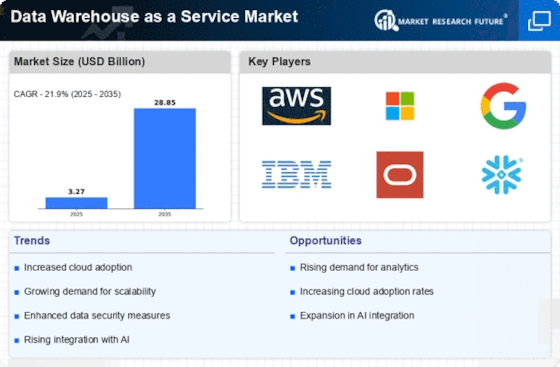Market Share
Data Warehouse as a Service Market Share Analysis
The Data Warehouse as a Service (DWaaS) market has seen significant development as of late, determined by the increasing demand for effective data management arrangements. In this serious landscape, market share situating strategies play a crucial job in deciding the outcome of service suppliers. The differentiation based on technological innovation is one of the popular ways. Companies try to provide sophisticated features and capabilities that make them unique compared with competitors. This may involve common data integration, faster query performance or improved security efforts. By consistently investing in research and development, suppliers are able to attract customers who want futuristic solutions; hence gaining a larger share of the market.
Another important strategy is guesstimating positioning. Evaluating models in DWaaS market can be as contrasting, from the pay-as-you go options to membership based plans. Few suppliers follow the strategy of expense leadership as they try to gain cost sensitive customers through low rates. On the other hand, high-end pricing strategies focus on providing more value through digital capabilities, client service or personalization options. The communication of value recommendation in this case is also critical because clients should recognize the increased cost as supported by additional benefits.
In addition, target client segments have a significant effect on the market share positioning. Suppliers may choose to focus on clear projects or business sizes, customizing their services according to the unique needs of such categories. Specialization enables the organizations to turn into experts in sure areas, giving them a favorable position and pulling in clients looking for industry explicit arrangements. For example, a DWaaS supplier may focus on healthcare data management characterized by compliance features and analytics tools customized for the health care industry and thus offering it with large market shares.
Collaboration and strategic alliances also play a critical role in market share positioning. In combination with other innovation companies, cloud service providers or data integration platforms may help a DWaaS supplier to extend its reach and develop more products. Opening new horizons, the companies are capable of providing a wider range of services to their clients as well as setting up market presence and even leaving behind competitors in isolated premises.
Client experience and satisfaction play an important role in the DWaaS market. The capacity of suppliers to supply user-friendly interfaces, efficient onboarding processes and prompt client care could be a strength for them in building relationships with their customer base. Positive customer interactions result in loyalty, then positive informal and this eventually adds to increased market share. Moreover, collecting and using customer feedback for continuous improvement is also critical within this dynamic environment.
Finally, global growth strategies are becoming more relevant in the DWaaS market. Due to the development of data-driven independent direction globally, suppliers are exploring possibilities beyond their local markets. Establishing areas of strength for a presence includes understanding local regulations, cultural nuances, and explicit industry needs. Companies that effectively navigate these challenges can tap into new client bases, differentiate their income streams, and enhance their overall market share.


















Leave a Comment